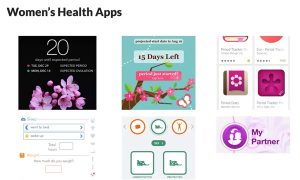Aug. 14, 2020
 Current self-tracking technologies are increasingly using algorithms to predict people’s everyday activities. Among these health and wellness app users are about 50 million women worldwide who use period tracker apps to help track menstrual cycles and predict ovulation.
Current self-tracking technologies are increasingly using algorithms to predict people’s everyday activities. Among these health and wellness app users are about 50 million women worldwide who use period tracker apps to help track menstrual cycles and predict ovulation.
“However, these predictions are normally designed as black boxes to end users, offering little transparency on how their algorithms work, how reliable the results are, and what personal data are collected and used in making those algorithmic suggestions,” notes Daniel Epstein, assistant professor in the department of Informatics.
Epstein along with Yunan Chen, associate rofessor in Informatics and Mayara Costa Figueiredo, an Informatics PhD candidate, are mentors in the SURF-IoT program.
The Summer Undergraduate Research Fellowship in the Internet of Things (SURF-IoT), provides a unique 10-week summer research opportunity for UCI undergraduates to become immersed in research and applications related to the Internet of Things (IoT).
Epstein’s SURF-IoT research project, “Understanding User Perceptions of Algorithms Prediction in Personal Health” aims to understand the design of data tracking technologies and algorithmic decision-making technologies in the context of personal health.
Epstein and Figueiredo recently meet with SURF-IoT fellows via Zoom to share their research findings on women’s health tracking apps.
Period and fertility-tracking apps typically have perceptions and make assumptions about the people using them, but these perceptions and assumption are often wrong, Epstein says. “They assume the user has a regular menstrual cycle, when the reason someone needs a period app is because they have irregular periods,” he says. Gender identity is another assumption with nearly every period-tracking app presuming the user identifies as female. Additionally, most apps that track sexual activity and ovulation assume the user is trying to get pregnant. Though their research found this is not the intent for many users.
These assumptions can make people feel excluded by their apps or create or perpetuate feelings of anxiety, and present unrealistic expectations of control, Epstein added.
Figueiredo found additional challenges for users of fertility-tracking apps and described uncertainties women can face when self-tracking their fertility for different goals.
Most apps are not supported to respond to specific experiences such as breast feeding or miscarriage, she says. In the event of a miscarriage, “this can be a problem because some of these apps keep sending messages to the user as if the user was still pregnant which can be very disheartening for a person,” she says.
Menopause, a time when periods become irregular until they stop, includes a series of specific experiences and symptoms that are not often supported by the apps, she says. She also found apps were not able to identify inconsistencies that could be side effects from birth control medication.
“Fertility is related to multiple aspects and events of a person’s life. There are many reasons to track one’s fertility and menstrual cycles. People track fertility in different ways. Apps that aim to be comprehensive should support holistic tracking,” she concluded.
SURF-IoT 2020 talk series is presented via ZOOM and open to the public. To view a schedule of future speakers and register for attendance, visit events.
To view the complete presentation, visit SURF-IoT: Tracked Data and Women’s Health.
– Sharon Henry
